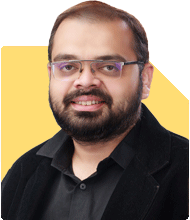Should I pursue an MBA in AI & DS at IIT Mandi with a BTech in ECE?
Patrick Dsouza |1428 Answers |Ask -Follow
CAT, XAT, CMAT, CET Expert - Answered on Jun 21, 2024
Along with his wife, Rochelle, he trains students for competitive management entrance exams such as the Common Admission Test, the Xavier Aptitude Test, Common Management Admission Test and the Common Entrance Test.
They also train students for group discussions and interviews.
Patrick has scored in the 100 percentile six times in CAT. He achieved the first rank in XAT twice, in CET thrice and once in the Narsee Monjee Management Aptitude Test.
Apart from coaching students for MBA exams, Patrick and Rochelle have trained aspirants from the IIMs, the Jamnalal Bajaj Institute of Management Studies and the S P Jain Institute of Management Studies and Research for campus placements.
Patrick has been a panellist on the group discussion and panel interview rounds for some of the top management colleges in Mumbai.
He has graduated in mechanical engineering from the Motilal Nehru National Institute of Technology, Allahabad. He has completed his masters in management from the Jamnalal Bajaj Institute of Management Studies, Mumbai.... more

Sir how is iit mandi integrated mba in artificial intelligence and data science in terms of future prospects and placement. Please also clarify. 1. How mba degree compare with btech in ai and ds. 2. Will this help in technical job in it company like google Microsoft etc 3 should i take this or btech in ece Please guide us.
You may like to see similar questions and answers below
Kasam Shaikh | Answer |Ask -Follow
AI Tech Expert - Answered on Jul 24, 2024
Nayagam P P |10854 Answers |Ask -Follow
Career Counsellor - Answered on Feb 19, 2025
Patrick Dsouza |1428 Answers |Ask -Follow
CAT, XAT, CMAT, CET Expert - Answered on Jul 25, 2025
Dr Dipankar Dutta |1841 Answers |Ask -Follow
Tech Careers and Skill Development Expert - Answered on Dec 14, 2025
Nayagam P P |10854 Answers |Ask -Follow
Career Counsellor - Answered on Dec 14, 2025
Radheshyam Zanwar |6744 Answers |Ask -Follow
MHT-CET, IIT-JEE, NEET-UG Expert - Answered on Dec 14, 2025
Radheshyam Zanwar |6744 Answers |Ask -Follow
MHT-CET, IIT-JEE, NEET-UG Expert - Answered on Dec 14, 2025
Dr Dipankar Dutta |1841 Answers |Ask -Follow
Tech Careers and Skill Development Expert - Answered on Dec 14, 2025
Dr Dipankar Dutta |1841 Answers |Ask -Follow
Tech Careers and Skill Development Expert - Answered on Dec 13, 2025
Dr Dipankar Dutta |1841 Answers |Ask -Follow
Tech Careers and Skill Development Expert - Answered on Dec 13, 2025
Mayank Chandel |2575 Answers |Ask -Follow
IIT-JEE, NEET-UG, SAT, CLAT, CA, CS Exam Expert - Answered on Dec 13, 2025
Radheshyam Zanwar |6744 Answers |Ask -Follow
MHT-CET, IIT-JEE, NEET-UG Expert - Answered on Dec 13, 2025
Mayank Chandel |2575 Answers |Ask -Follow
IIT-JEE, NEET-UG, SAT, CLAT, CA, CS Exam Expert - Answered on Dec 13, 2025




















